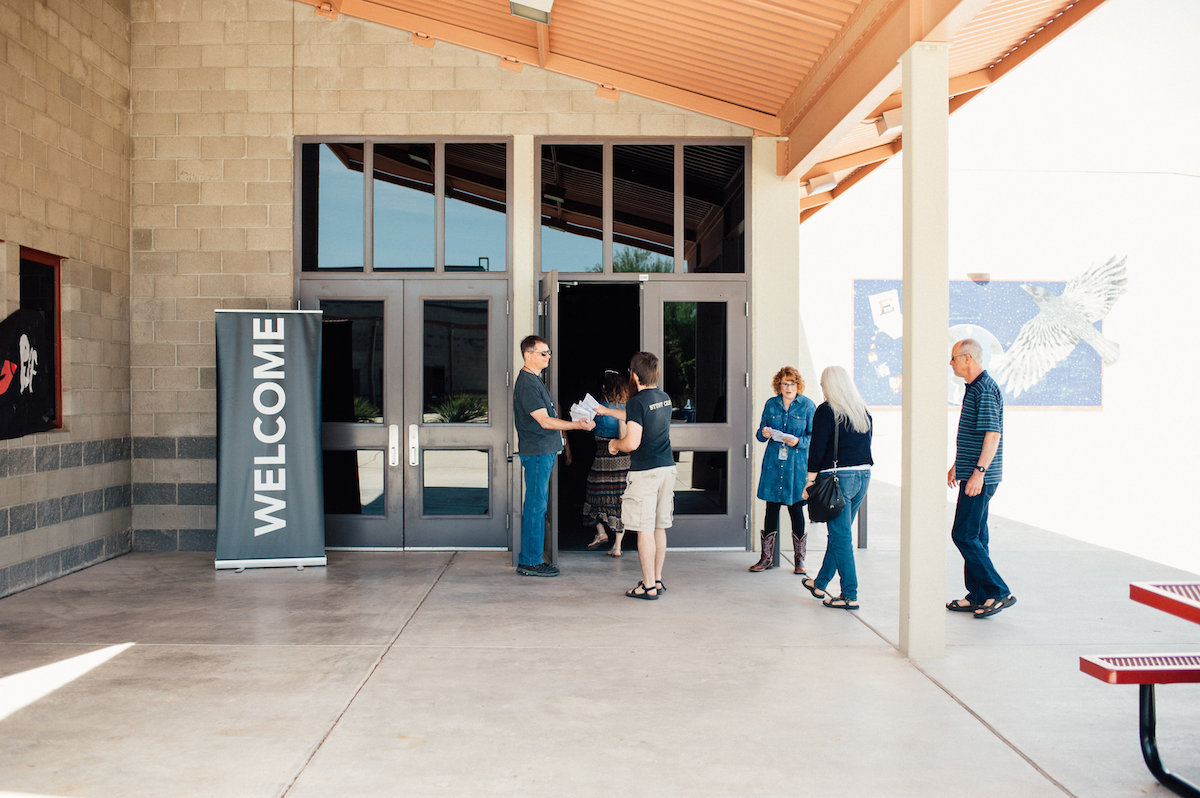Have you ever walked into a trendy coffee shop and felt stupid because you asked for a vanilla pump? Or walked into a Crossfit gym and felt out of place because you didn’t know what a WOD was or why they call the gym a box? To get over those obstacles, you need a friendly barista who can explain to you why they don’t offer sweeteners and can suggest something similar. Or you need a welcoming trainer who can clue you in on the verbiage of Crossfit. When employees go out of their way to make a customer feel cared for, the customer usually chooses to make a monetary transaction.
The same is true for churches; feeling welcomed and cared for usually leads to a newcomer making a transaction of trust. If someone trusts, they will connect. As lovers of Jesus who understand God’s hospitality to us, we should be the most welcoming and willing to make someone feel cared for. Someone shouldn’t feel more valued in the bar or Starbucks next door than they do when walking into your church building on a Sunday.
The point is that connecting people to your church requires excellent customer service. As Christians, we should have the best customer service in town, because the Holy Spirit empowers us and instead of dealing with people’s appetite or fitness, we are dealing with people’s souls.
As a point of explanation, I use the term customer service because you can easily find a host of PRACTICAL resources on customer service and customer experience. But if your stomach is turning at the phrase, merely interject the words “biblical hospitality” in its place, as that’s how the concept applies in our churches.
I have found that most churches have an understanding of this need, but struggle with implementing it. In light of that, below are some crucial questions to ask about your church.
Is your church welcoming?
We must have a critical eye when walking through our churches. We need to put ourselves in the shoes of a first timer. Is your signage helpful? Do you have friendly people greeting at the doors? Is your building clean? Is the language from stage Christian jargon or do “normal” people understand it? When someone asks where the restroom is, do you or your volunteers walk them to the bathroom while giving them a tour of the building, or just point them in the general direction and hope they make it? Taking simple steps in the direction of hospitality can be the difference between a one-time visitor and someone who feels like they found a place they belong.
Is someone thinking specifically about hospitality?
I have found that when we say “everyone is thinking about it” it usually means no one is thinking about it. Hospitality can easily land on the back burner behind more concrete items or tasks. It is not easily measurable; therefore the accountability is very low. However, the “7-minute statistic” tells us that it takes 7 minutes for someone to decide if they are coming back to your church; before they have even heard the sermon. Though hospitality is hard to measure, it is easily one of the most critical aspects to invite in newcomers. This is why you need someone who is always thinking through this lens. This person can be a deacon, pastor or a volunteer, but someone needs to be thinking about a first-time attendees’ experience.
Are you making connecting too confusing?
Are you clearly communicating what a newcomer can do to get further connected to your church? When first looking into this at our church, we realized were asking our newcomers to do a number of things depending on the week: sign up for a Community Group or a serving team, go to the connect desk, fill out a connect card, sign up to be a member, RSVP online, or meet one of the Pastors wearing a lanyard. Needless to say, we were giving them too many options, and that is overwhelming. Think through what a fully integrated member of your church looks like, and then work backward to create simple steps for newcomers to get there. (Hint: It probably shouldn’t be more than 3 or 4 steps).
The steps we map out for our newcomers are:
- I’m new here > Take this time to observe and evaluate Living Stones
- I want to know more > Attend Starting Point to learn how you can get connected and start building friendships here at Living Stones
- I want to connect > Join a Community Group or serving team. Joining one of these gives you the opportunity to meet people and begins to make a big church feel a little smaller.
- I want to join > Become a member. Attend one of our member classes if you feel like Living Stones is your church home.
Are you making connecting to your church too big of a commitment?
Are you asking people to dive into the deep end, when they haven’t even learned to swim? This is a mistake we made early on. We were communicating that joining a Community Group was THE step to meeting people in the church. To the average person, meeting 10+ strangers in an unknown house and talking about your life struggles sounds like a nightmare. Our churches need baby steps! The baby step Living Stones created is Starting Point, which is a 20-minute event on the first Sunday of every month, no RSVP required. It’s held after each gathering and attendees meet a couple Pastors and leaders as well as hear about ways to get a bit more connected in such a big church. We named it Starting Point to give people a trajectory. If you give people stepping stones, they will take steps. Whatever your context is, and whatever you want to name it, your first-timers need a baby step. Think low-commitment and non-intimidating!
We have been invited to God’s table. Through His Son, we have received the spirit of adoption. We are all image bearers of Christ, and the Church is God’s chosen way to express to His lost sheep that they have inherent integrity as image-bearers and are valued as sons and daughters. With that truth, our churches should be the most welcoming and hospitable places in our cities. When people walk through our doors, they should feel seen, heard and valued. I trust that we all know this, but struggle to put it in play. These customer service tools help us to express what we all know is right so that we can connect people to our churches and invite them into the family.











